Use 'Print preview' to check the number of pages and printer settings.
Print functionality varies between browsers.
Printable page generated Thursday, 5 February 2026, 11:32 AM
V01p: Sharing ideas: developing wikis
Course information
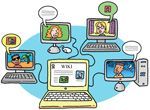
You will need access to:
- a computer with a web browser
- a class/group of pupils – groups could be within classes, whole classes, or groups across classes (e.g. clubs) and schools (e.g. clusters of schools or in collaborative projects).
Duration of the course: 20 hours over eight weeks
- Online total: 13 hours
- individual: 9 hours (e.g. reading, doing quiz, editing personal wiki)
- collaborative: 4 hours (e.g. forum discussion, editing communal wiki).
- Offline total: 7 hours
- face-to-face: none
- workplace: 5 hours (setting up and using wiki with pupils)
- independent study: 2 hours (supplementary reading, reflection and documenting evidence for future accreditation).
Learning outcomes
Professional and reflective practitioner skills
At the completion of this course, you should be able to:
- incorporate the use of a wiki with learners in their school and subject contexts as appropriate
- reflect on, and discuss, the impact of the use of a wiki on learning.
Practical skills
At the completion of this course, you should be able to:
- edit a wiki page
- select a wiki tool appropriate for intended use
- set up a wiki
- incorporate text and other media on a wiki page
- manage users (authors, reviewers etc) of a wiki.
Knowledge and understanding
At the completion of this course, you should be able to demonstrate:
- that you know what a wiki is
- that you know what wikis may be used for in education
- an understanding of the issues involved in using wikis in the classroom.
Cognitive skills
At the completion of this course, you should be able to:
- critically review the use of wikis in educational contexts and share these reviews with others
- discuss different ways in which wikis might be used in learning contexts in schools.
Course schedule
| Week | Activities | Type | Duration |
| 1 | Activity 1 Getting to know others on the course | Online | 1 hour |
| Activity 2 So what is a wiki? | Online | 30 minutes | |
| 1–2 | Activity 3 Wikis and e-safety | Online | 1 hour |
| Activity 4 Field trip | Online | 2 hours | |
| Activity 5 Finding other examples of wikis | Online | 1 hour | |
| Activity 6 What others have said about wikis | Offline | 1 hour | |
| Activity 7 Planning to use wikis in your teaching and learning | 1 hour online, 1 hour offline | 2 hours | |
| 3 | Activity 8 Selecting a wiki tool | Online | 2 hours |
| 4–7 | Activity 9 Using the wiki | Classroom | 5 hours |
| 8 | Activity 10 Reporting back | Online | 2 hours |
| Activity 11 TDA Professional Standards | Online | 1 hour | |
| Activity 12 Extracting our shared learning | Online | 1 hour | |
| Activity 13 Course evaluation | Online | 30 minutes | |
| Total 20 hours |
Introduction

This is a course of eight weeks duration with 20 learning hours expected during that time.
We will begin by looking at existing wikis with an emphasis on those used in educational contexts; these range from generic websites like Wikipedia to those created and used by teachers for specific learning purposes in their classrooms and with their learners.
You will discuss the issues that this raises in terms of e-safety and learning and teaching.
The course will provide guidance on creating and using wikis and you will set up your own and trial it with some of your pupils.
You will either use a wiki on your school’s learning platform or, if this is not available to you, we will explain how to sign up to use one of the free online wiki services.
Throughout the course, and especially after you have used your wiki with your pupils, you will share your experiences with other participants.
The reflective cycle
Vital courses are based on a cycle of professional reflective practice as shown in the diagram below.
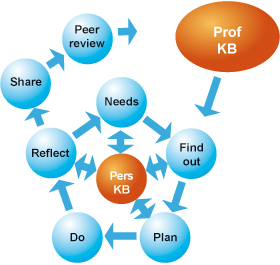
This cycle draws on, and develops, personal and professional knowledge bases. The latter may be seen in the literature, resources, policies and other materials that are used to inform practice.
Throughout the course small icons will indicate the stage of the cycle being addressed.
NB Prof/Pers KB = Professional/Personal knowledge base
Introducing ourselves
In the first parts of the course we will introduce ourselves and introduce the ideas behind the use of a wiki, including reviewing a couple of existing wikis to see how they are used in teaching and learning. But first we need to know who else is on the course as we will be sharing our thoughts and experiences with each other.
Activity 1 Getting to know others on the course
![]() The objectives of this course activity are to:
The objectives of this course activity are to:
- get to know the other participants on this course
- begin to think about how wikis are used (by using one).
1.1 Introduce yourself by going to the course wiki and adding something about you on your group page. You will be asked to add an image and link to a website that says something about where you live or work.
1.2 Who else is on the course? Look at the other pages in the wiki, reading what others have written. Go to the Introductions discussion in the course forum and meet the other members of the course. Briefly tell them why you chose this course and share your experience of using the wiki.
Introducing wikis

Learners often need space to share ideas and/or resources, or write together. This course looks at the use of a ‘wiki’ (a website which can be added to and edited by any number of people) for these purposes.
So what is a wiki? A wiki is a website for sharing and developing ideas, materials, plans etc. Any page of the website can be changed by anyone (sometimes usernames and passwords are needed, sometimes edits can be anonymous). Only one person can edit any one page at one time but as soon as they have finished and saved, anyone else can then edit it.
Activity 2 So what is a wiki?
![]() The objective of this course activity is to develop your understanding of what a wiki is.
The objective of this course activity is to develop your understanding of what a wiki is.
Watch this video from Commoncraft for a brief introduction.
If the video does not appear then there may be firewall/filtering issues. The video is less than five minutes long and you are advised to watch it on a machine that is not filtered if possible, or read the alternative description linked below.
For an alternative description of a wiki please see this resource (Becta 2010).
Thinking about the features of a wiki shown in the video, note down any first ideas of how you could use a wiki in your teaching.
Wikis and e-safety

E-safety is an issue to be considered whenever young people use the Internet. In this part of the course you will think about how a wiki can be used safely and ethically. This is particularly important given that anyone can edit any page on a wiki - but only if they have been given permission.
Activity 3 Wikis and e-safety
![]() The objective of this course activity is to begin to understand some of the issues and options you have to ensure a safe use of a wiki.
The objective of this course activity is to begin to understand some of the issues and options you have to ensure a safe use of a wiki.
Go to this resource on e-safety.
What would you do as a teacher to enhance the safe use of wikis?
Note down your answers and then look at the discussion that follows.
Discussion
![]() If using a wiki within a school, it is critical that its use is reflected in the school acceptable use policy (AUP). You might want to refer to your schools AUP. What does it say about the use of self-authoring / collaboration tools such as wikis? Does it need to be amended in light of this activity? If your school doesn't have an AUP you might want to download AUPs in Context: Establishing Safe and Responsible Online Behaviours. This publication provides a number of prompts and action points to help schools to develop effective AUPs
If using a wiki within a school, it is critical that its use is reflected in the school acceptable use policy (AUP). You might want to refer to your schools AUP. What does it say about the use of self-authoring / collaboration tools such as wikis? Does it need to be amended in light of this activity? If your school doesn't have an AUP you might want to download AUPs in Context: Establishing Safe and Responsible Online Behaviours. This publication provides a number of prompts and action points to help schools to develop effective AUPs
When you’re creating a wiki there are usually options to password protect it, to restrict access to specified users, or to make some areas public. There is always a facility to look at the history of changes to content and to see who has made those changes. These facilities should be referred to by the AUP.
A Wiki Warranty can also be used within the class to provide a focus and to reinforce e-safety using wikis. This example can be modified for use within your class or school.
Another merging issue is the ethical use of wikis and the ability for co-authors to easily overwrite or delete the contributions of others. Vandalism or An Accidental Overwrite: A Wiki Warning by Oliver Dreon Jr. (2008) is an interesting example of what can happen.
Safety tips when using wikis:
- Educating pupils that they are responsible for any anything they may write or edit is a good starting point for using wikis safely and ethically.
- Anyone can edit any page on wiki. They can also see what anyone else has written on a wiki – but only if they have been given permission. Think about what permissions users need.
- When you creating a wiki there are usually the options to password protect it, to restrict access to specified users, or to make some areas public.
- There is always a facility to look at the history of changes to content and to see who has made those changes.
- Remind pupils not to include personal information about themselves (including photographs), other pupils, staff or family members that can allow someone to be identified or located geographically.
![]() Want to find out more? (Optional)
Want to find out more? (Optional)
Here are some useful websites about e-safety. These examples do not refer specifically to wikis but they do provide a useful introduction to e-safety and many of the issues that schools need to consider.
This programme, based at Parkwood Primary School in Bradford, demonstrates five key messages which underpin its whole school approach to e-safety.
Know IT All provides a suite of education resources designed to help educate parents, teachers and young people about safe and positive use of the internet.
Thinkuknow is a website about e-safety for pupils, teachers and parents. You’ll find out what’s good, what’s not and what you can do about it. There are games and resources you can use in the classroom.
Digital Citizenship website is about building safe spaces and communities and how to manage personal information. It provides resources and games for classroom use. The cyberbullying resources are particularly useful.
The Child Exploitation and Online Protection (CEOP) delivers a multi-agency service dedicated to tackling the exploitation of children. This website provides guidance for teachers, caregivers and professionals.
Teacher voice
“… we've been thinking about e-safety quite a lot at my school. We had an e-safety week, where children took part in a wide range of activities. I also ran a meeting for parents … it really raised their awareness of the issues. One of the sites I showed to the parents was Think U Know. …It uses the excellent Cybercafe resources, which I've been using for many years as part of my Internet Safety lessons at the start of each year”.
Mark Warner, primary class teacher in Kent.
You can read more here about e-safety and the GlobalDover Wiki Project (2008). This is an optional activity.
Exploring wikis

Wikis are gaining popularity with teachers who recognise its power as a creative and collaborative tool. Teachers are exploring ways of integrating them into their teaching and learning. Some are sharing examples of pupil work, others are encouraging pupils to contribute to a class wiki.
Wikis are already being used extensively in education, though often for reading rather than writing. Wikipedia is often used as a source of information, for example, and has a specific schools section organised by the subjects of the National Curriculum.
Activity 4 gives you a chance to explore some examples of how teachers and school advisers are using wikis. However, as pointed out in the e-safety section, teachers may decide to hide from view what their classes are doing so the best uses may well be hidden!
Activity 4 Field trip
![]() The objectives of this course activity are to:
The objectives of this course activity are to:
- look at some existing wikis that are used for learning and teaching
- share thoughts about how they are being used.
4.1 Looking at existing wikis Table 2 shows several examples of the use of wikis in primary schools. Go to the examples by clicking on the links. Reflect on how they are being used to enhance learning and teaching and on the way in which they are presented and structured.
| Key stage | Curriculum | What's this wiki about? |
| 1 | Maths | 'Primary Math' has been set up to enable students in Canada to share their maths learning with classes around the world. Students have uploaded images of patterns, numbers and shapes etc |
| 2 | English | 'Terry the Tennis Ball' is a collaborative story developed by students at a primary school in Australia. |
| 2 | Science | 'Sound and Light', a wiki by students, for students, based in the UK. There are examples of student work using a range of media from photos through to audio and video files. |
| 1-2 | English | 'And to think I saw it on my way to school' is a wiki developed by a cluster of schools in America inspired by a Dr Seuss book. There are examples of student work using a range of publishing tools. |
Reminder
![]() Have you read and responded to introductions posted at the beginning of the course?
Have you read and responded to introductions posted at the beginning of the course?
4.2 Discussing with others. Look at one or two of the examples above and reflect on how each of these have been set up and how they might be used. Go to the forum and discuss them with the other course members. The forum contains more specific guidance on the things to look for and think about. You should expect to go back to the forum at least three times to take part in the discussion.
Teacher Voice
“The tasks are challenge-based learning; the pupils are given experiments to do and they've got to decide how to record them and then post them to the wiki. Some of them make PowerPoints and put them into SlideShare so they can be viewed on the web. Some of them record on audio, some of them record on video." It helps, he says, to motivate children who are daunted by the idea of writing a whole report. John Johnston, class teacher, Sandaig Primary School (2008).
This extract was taken from Primary Pioneers.
Thinking about structure

Wikis, like any other website can have different structures to suit different contexts. These range from a single web page to a series of linked web pages both of which can be edited by individuals or groups of people.
The structure of any wiki used in a learning context may well be derived from the way in which learning is structured in classrooms with groups and tasks represented by different wiki pages. On the other hand the use of a wiki allows for learning and sharing to go on over time, not constrained by ‘the lesson or session’, and to go on over space not constrained by the physical buildings.
The structure of any wiki used in a learning context may well be derived from the way in which learning is structured in classrooms – using groups and tasks to be represented on pages for example. On the other hand the use of a wiki allows for learning and sharing to go on over time, not constrained by ‘the lesson or session’, and to go on over space not strained by the physical buildings.
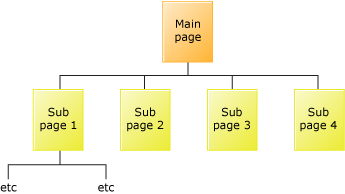
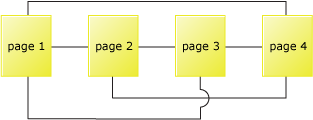
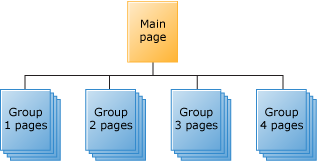
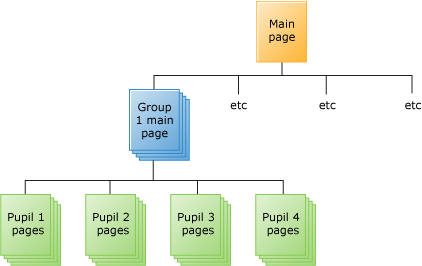
By looking at other examples of wikis and seeing what other people are doing and thinking about how to use wikis, you will be able to generate ideas about how you might structure and use a wiki to suit your own context.
Finding relevant examples
Activity 5 Finding other examples of wikis
![]() The objective of this course activity is to look for ideas for the use of wikis in learning and teaching that match your interest and area of expertise.
The objective of this course activity is to look for ideas for the use of wikis in learning and teaching that match your interest and area of expertise.
The Vital wiki contains a growing number of examples and mini-case studies showing how other people have used wikis in their teaching. Use the internet to look for one or two case studies that match your own interests and area of expertise, or you could discuss with colleagues.
You can use these examples to generate ideas help you with planning your own use of wikis in the classroom.
If you cannot find anything there you may need to search for examples using an Internet search or ask for guidance in the course forum.
If you know of other examples please add them to the index page.
Planning to use a wiki

In this part of the course you will think about the ways in which a wiki might be used for learning and teaching in your context and share your plans with others. You will also be guided to a range of software tools to help create a wiki and select the most suitable tool for your teaching and learning purposes.
Activity 6 What others have said about wikis
![]() The objective of this course activity is to understand some of the theoretical and research-informed models behind the use of wikis in teaching and learning.
The objective of this course activity is to understand some of the theoretical and research-informed models behind the use of wikis in teaching and learning.
Read the following articles and highlight any key points that appear pertinent to your context. You will use these points in your planning in the next activity.
- ‘Collaborative learning the wiki way’ Engström and Jewett (2005)
- ‘The potential of wikis in the classroom’ Fountain (2005)
- ‘The good, the bad and the wiki’ Wheeler, Yeomans and Wheeler (2008)
- ‘A five stage model for the use of a wiki’ Wheeler (2008)
Activity 7 Planning to use wikis in your teaching and learning
![]() The objective of this course activity is to produce a plan for the use of wikis in your classroom.
The objective of this course activity is to produce a plan for the use of wikis in your classroom.
You will need to download the planning sheet.
How might you use a wiki in your own teaching? What would you be intending to do and with which classes or groups of learners? Go to the course forum and discuss this with other participants.
Having discussed this with others, complete a planning sheet for your own use.
The planning sheet is to help guide your thoughts on how you might use a wiki in your own teaching. It prompts you to consider:
- the context of the use of the wiki – which class, level, topic, how long etc.
- the purpose of using the wiki – what are the learners using this technology for (share ideas, joint planning, share presentations, add to and share collated resources etc.) – you may find the five-stage model of Wheeler (2008) useful here
- the pedagogical issues raised by Fountain (2005) and Engström and Jewett (2005) when considering the use of wikis in the classroom
- the learning gains or learning intentions (Curriculum Corporation, Australia)
- what impact you expect the use of a wiki to have (e.g. greater motivation, more collaboration, greater understanding of a topic etc.).
Reminder
Have you discussed the use of wikis in activity 4?
Once you have completed the planning sheet you should post it in the forum for others to help refine your ideas.
Activity 8 Selecting a wiki tool
![]() The objective of this course activity is to identify a tool for your use of a wiki in a school.
The objective of this course activity is to identify a tool for your use of a wiki in a school.
Firstly you need to find out if you can use a wiki tool as part of your school learning platform. If this isn't possible, the TeachersFirst website provides a list of wiki tools for educators and guidance on their use.
For a very simple 'first taste' of using a wiki with other people, you could try Webnote.
No passwords are required and it is easy to start a single page wiki by typing a name for your wiki in the field 'Create or Load a Workspace'.
Using the wiki for teaching and learning

Having planned the way in which you will use the wiki in your classroom you now need to carry out your plan. In this part of the course you will spend time in your school and reflect on the impact of the use of a wiki on the learning and teaching. At a practical level you will observe what the learners did with the wiki and what conclusions and recommendations you would make for others. You will discuss this in the forum after you have carried out your plan.
Activity 9 Using the wiki
![]() The objective for this course activity is to use wiki with learners and reflect on what happens.
The objective for this course activity is to use wiki with learners and reflect on what happens.
You should now carry out your plan and use the wiki with the group or groups you identified. As you do so you should be minded of your purpose and intended gains and the evidence you intend to collect.
No passwords are required and it is easy to start a single page wiki by typing a name for your wiki in the field 'Create or Load a Workspace'.
It is a good idea to maintain a learning journal to help you record observations and reflections systematically. Mark Smith gives advice on how to do this in his article on writing and keeping journals. This can be done online using your personal blog in your shared activities or other tools. Alternatively, simply use a notebook where you can collect observations down one side of a double page and your reflections on the other.
Reflection

Having planned what you were to do with a wiki, and then carried this out with learners, this is the final section of the course. You will report back your reflections of what you learnt by using wikis in the classroom. This reporting back will be done to others on the course with whom you should also share feedback on experiences.
Activity 10 Reporting back
Reminder
![]() Did you post and receive feedback on your and others’ plans in activity 7?
Did you post and receive feedback on your and others’ plans in activity 7?
The objective of this course activity is to share reflections and feedback with others.
You will now reflect on, and discuss, the impact of the use of a wiki on learning. In your planning you identified some purposes and pedagogical aims.
To what extent were those gains achieved? How do you know? What evidence can you provide? Go to the forum to discuss these questions.
Click the discussion button for some key questions to help you evaluate.
Discussion
| What did the learners do? | What did the pupils do while using the wiki? |
| What are they learning and how do you know? | This is an issue of assessment including observation, discussion, question and answer, testing, etc. |
| Was it worthwhile? | This question relates to your purposes and intended pedagogical aims. |
| What did I do? | Action enquiry is often done by individuals in their own work. There can be a group asking themselves the same questions. This question requires a description of your own actions. |
| What did I learn? | This requires analysis of your data and reflection on your answers. |
| What do I intend to do next? | This relates to your next steps for action. This is where you will try to do things to achieve an improvement and to make the work you do with learners more worthwhile in your terms. |
Want to find out more? (Optional)
The Periodic Fable website provides a list of the advantages & disadvantages of using a wiki in an educational context. You might reflect on whether your use concurs with this list.
Professional Standards
The use of wikis in learning and teaching will provide you with evidence that may be useful when considering the Professional Standards for teaching. You will have collected evidence from planning through to your notes and evaluation to discussion in the forum. Such evidence may be useful to you when demonstrating ways in which you have met the Standards.
Activity 11 TDA Professional Standards
![]() The objective of doing this course activity is to reflect on what you have done in relation to the TDA Standards.
The objective of doing this course activity is to reflect on what you have done in relation to the TDA Standards.
Depending on the stage of your career, different Standards may be relevant. Consider which ones are most pertinent to your role and note them here. Once you have made some notes click the Discussion button to reveal a possible set of standards.
Discussion
C7: Evaluate their performance and be committed to improving their practice through appropriate professional development.
C8: Have a creative and constructively critical approach towards innovation; being prepared to adapt their practice where benefits and improvements are identified.
C17: Know how to use skills in literacy, numeracy and ICT to support their teaching and wider professional activities.
C27: Design opportunities for learners to develop their literacy, numeracy, ICT and thinking and learning skills appropriate within their phase and context.
P10: Contribute to the professional development of colleagues through coaching and mentoring, demonstrating effective practice, and providing advice and feedback.
E2: Research and evaluate innovative curricular practices and draw on research outcomes and other sources of external evidence to inform their own practice and that of colleagues.
E14: Contribute to the professional development of colleagues using a broad range of techniques and skills appropriate to their needs so that they demonstrate enhanced and effective practice.
Shared learning

The reflective practitioner cycle is based on developing the professional knowledge base. We have now come to the end of the personal reflection phase and are to develop a common understanding of what we have learnt. We will share the key learning points as a group so that these may be collated and added to the community knowledge.
Activity 12 Extracting our shared learning
![]() The objectives of this course activity are to discuss and agree what we have learnt as a group.
The objectives of this course activity are to discuss and agree what we have learnt as a group.
Go to the course forum and, in the Discussion called ‘Shared Learning’, post the key learning points that have emerged for you during the course. With your facilitator, agree on the common shared learning from the group.
Evaluation and certification
This final section allows for evaluation and certification.
Activity 13 Course evaluation
![]() The objectives of this course activity are to complete an evaluation form and, if you wish, print a course completion certificate and rate and review the course.
The objectives of this course activity are to complete an evaluation form and, if you wish, print a course completion certificate and rate and review the course.
Your task is to complete the evaluation questionnaire, which can be found on the course page. There are also links there to print a certificate and rate the course. The certificate will be ‘released’ by your facilitator.
References
Videos
- Lefever, L. (2007) Wikis in Plain English, Commoncraft http://www.youtube.com/ watch?v=-dnL00TdmLY Accessed 7 January 2010
- Teachers.TV ‘E-safety – Five Whole-School tips’ http://www.schoolsworld.tv/ videos/ five-whole-school-tips Accessed 8 January 2010
Other references
- Becta (2009) AUPs in context: Establishing safe and responsible online behaviours http://teachfind.com/ becta/ fe-and-skills-aups-context-establishing-safe-and-responsible-online-behaviours-becta Accessed 7 January 2010.
- Becta (2010). What are wikis? http://webarchive.nationalarchives.gov.uk/ 20110113101521/ http:/ nextgenerationlearning.org.uk/ At-School/ Technology/ Wikis/ Accessed 11 March 2010.
- Becta (2010) Safeguarding [online] available at http://webarchive.nationalarchives.gov.uk/ 20110113101521/ http:/ nextgenerationlearning.org.uk/ safeguarding Accessed 7 October 2010
- Child Exploitation and Online Protection Centre (CEOP) Thinkuknow http://www.thinkuknow.co.uk/
- Childnet International: Know IT all http://www.childnet-int.org/ kia/ Accessed 8 January 2010.
- Childnet International: Digizen.org http://www.digizen.org Accessed 8 January 2010
- Curriculum Corporation, Australia. Assessment for learning http://www.assessmentforlearning.edu.au/ professional_learning/ modules/ learning_intentions/ learning_intentions_landing_page.html Accessed 8 January 2010.
- Dreon, O. Jr. (2008 ) ‘Vandalism or an accidental overwrite: ‘a wiki warning’ Tech and Learning http://www.techlearning.com/ article/ 14938 Accessed 8 January 2010.
- Engström, M. and Jewett, D. (2005) ‘Collaborative earning the Wiki Way’, TechTrends: Linking Research & Practice to Improve Learning (8756-3894) 1 November 2005. vol. 49, issue 6; pp.12–68.
- Fountain, R. (2005) ‘Wiki pedagogy’ Dossier Technopédagogiques http://www.profetic.org/ dossiers/ spip.php?rubrique110 . Accessed 9 November 2009.
- Monk Peak, A. (2008) ‘The GlobalDover wiki project’. From Making hard topics in English easier with ICT NATE, http://www.nate.org.uk/ cmsfiles/ ict/ h2t/ 12_GlobalDover.pdf Accessed 8 January 2010.
- Smith, Mark (1999, 2006), 'Keeping a learning journal', the encyclopaedia of informal education, www.infed.org/ research/ keeping_a_journal.htm. Accessed 8 January 2010.
- Teacher Development Agency (TDA) (2007) Professional Standards for Teachers [online] http://www.tda.gov.uk/ teachers/ professionalstandards.aspx . Accessed 9 November 2009.
- TeachersFirst ‘’Wiki step by step’ http://legacy.teachersfirst.com/ content/ wiki/ wikistep2.cfmAccessed 8 January 2010.
- TeachersFirst ‘Twiki issues: keys to a safe and positive wiki’. http://legacy.teachersfirst.com/ content/ wiki/ issues.cfmAccessed 8 January 2010.
- Thomas, K (2008) ‘Primary pioneers’, Futurelab http://archive.futurelab.org.uk/ resources/ publications-reports-articles/ web-articles/ Web-Article997 Accessed 8 January 2010.o
- Wheeler, S, (2008), ’Wiki activities 5-stage model’, Learning with ‘e’s. http://steve-wheeler.blogspot.com/ 2008/ 04/ wiki-activities-5-stage-model.html . Accessed 7 January 2010.
- Wheeler, S., Yeomans, P. and Wheeler, D. (2008)‘The good the bad and the wiki: Evaluating pupil-generated content for collaborative learning’ British Journal of Educational Technology, vol.39 no.6, pp.987–995.
- Whitehead, H. Periodic Fable websitehttp://www.helenwhitehead.com/ blog/ 2007_08_01_archive.html
Wikis
- And to think I saw it on my way to school http://andtothink.wikispaces.com/ How+This+Wiki+Began
- Primary Math http://primarymath.wetpaint.com/
- Sound and Light. Sandaig Primary School wiki http://www.sandaigprimary.co.uk/ wiki/ index.php?n=SoundAndLight.SoundAndLight
- Terry the Tennis Ball http://terrythetennisball.wikispaces.com/ About
Acknowledgements
Engstrom, M. and Jewett, D. (2005), ‘Collaborative Learning the Wiki Way’, Tech Trends, volume 49, issue 6, pp. 12-15, courtesy of AECT.
'The GlobalDover wiki project', Amanda Monk Peak, Dover Grammar School for Boys, from 'Making hard topics in English easier with ICT', © NATE, 2008 (find project at www.nate.org.uk/htt)